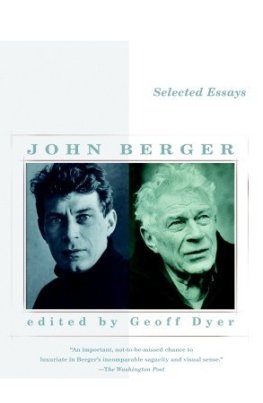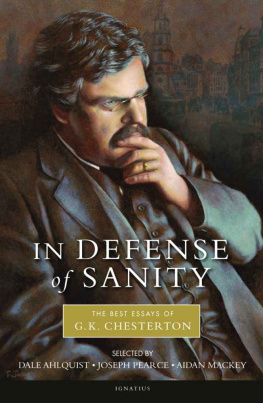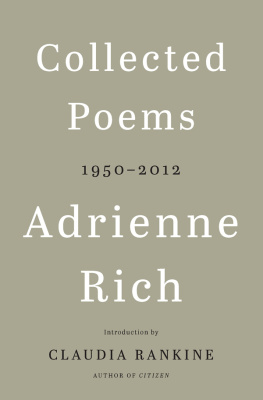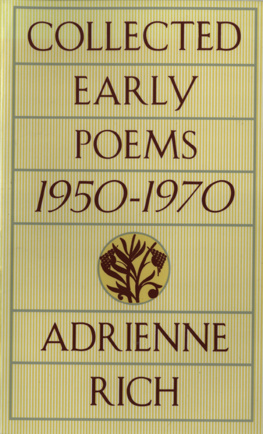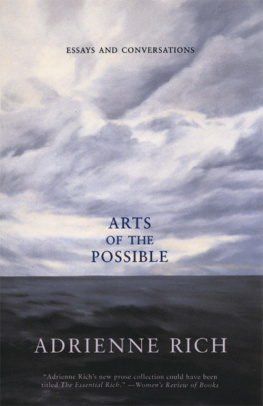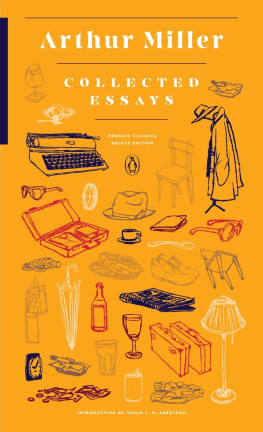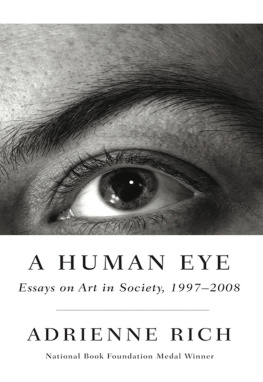
BY ADRIENNE RICH
Collected Poems 19502012
Later Poems: Selected and New, 19712012
Tonight No Poetry Will Serve: Poems 20072010
A Human Eye: Essays on Art and Society, 19972008
Poetry & Commitment: An Essay
Telephone Ringing in the Labyrinth: Poems 20042006
The School Among the Ruins: Poems 20002004
What Is Found There: Notebooks on Poetry and Politics
The Fact of a Doorframe: Poems 19502001
Fox: Poems 19982000
Arts of the Possible: Essays and Conversations
Midnight Salvage: Poems 19951998
Dark Fields of the Republic: Poems 19911995
Collected Early Poems 19501970
An Atlas of the Difficult World: Poems 19881991
Times Power: Poems 19851988
Blood, Bread, and Poetry: Selected Prose 19791985
Your Native Land, Your Life: Poems
Sources
A Wild Patience Has Taken Me This Far: Poems 19781981
On Lies, Secrets, and Silence: Selected Prose 19661978
The Dream of a Common Language: Poems 19741977
Twenty-One Love Poems
Of Woman Born: Motherhood as Experience and Institution
Poems: Selected and New, 19501974
Diving into the Wreck: Poems 19711972
The Will to Change: Poems 19681970
Leaflets: Poems 19651968
Necessities of Life
Snapshots of a Daughter-in -Law: Poems 19541962
The Diamond Cutters and Other Poems
A Change of World
Essential Essays
CULTURE, POLITICS, AND THE ART OF POETRY
Adrienne Rich
Edited and with an Introduction by Sandra M. Gilbert

Adjusting type size may change line breaks. Landscape mode may help to preserve line breaks.
Copyright 2018 by the Adrienne Rich Literary Trust
Copyright 2009, 2003, 2001, 1993, 1986 by Adrienne Rich
Copyright 1979, 1976 by W. W. Norton & Company, Inc.
Introduction copyright 2018 by Sandra M. Gilbert
All rights reserved
First Edition
Since this page cannot legibly accommodate all the copyright notices, constitute an extension of the copyright page.
For information about permission to reproduce selections from this book, write to Permissions, W. W. Norton & Company, Inc., 500 Fifth Avenue, New York, NY 10110
For information about special discounts for bulk purchases, please contact W. W. Norton Special Sales at specialsales@wwnorton.com or 800-233-4830
Book design by Chris Welch Design
Production manager: Julia Druskin
JACKET DESIGN BY YANG KIM
ISBN 978-0-393-65236-9
ISBN 978-0-393-35514-7 (eBook)
W. W. Norton & Company, Inc., 500 Fifth Avenue, New York, N.Y. 10110
www.wwnorton.com
W. W. Norton & Company Ltd., 15 Carlisle Street, London W1D 3BS
Contents
The texts for Adrienne Richs prose printed here are taken from the most recent versions published by W. W. Norton during her life. Where Rich updated an earlier essay with new notes or additions (for example, Compulsory Heterosexuality and Lesbian Experience in 1986 or The Distance Between Language and Violence in 2003) that later text is used.
The Treasures That Prevail
Toward the end of Diving into the Wreck, one of her most renowned poems, Adrienne Rich explains the goals of her underwater journey:
I came to explore the wreck.
The words are purposes.
The words are maps.
I came to see the damage that was done
and the treasures that prevail.
I stroke the beam of my lamp
slowly along the flank
of something more permanent
than fish or weed
the thing I came for:
the wreck and not the story of the wreck
the thing itself and not the myth
Here, she says, is the imperative of investigation, needful research into the damage that was done / and the treasures that prevail. Arguably, as she confided she had discovered sometime in the sixties, such research into realitythe thing itself and not the mythwas a major aim of her work as a poet. But perhaps it hasnt yet been clearly enough understood how crucially her writings in prose complemented, supplemented, enriched, and, yes, inspired her writing in verse. For in these writings she was not just one of many contemporary poets illuminating her verse through confessional glosses but a major memoirist, essayist, theorist, and scholar.
As an undergraduate at Radcliffe, Rich has said, she was enthralled by the poems of W. B. Yeats, from whose lucid cadences she took what she needed to enhance her aesthetic craft. As she confides in Blood, Bread, and Poetry, the dialogue between art and politics... excited me in his work, along with the sound of his language. To be sure, there are countless differences between these two writers, in particular large gaps between the Irish artists problematic sexual politics and Richs radical reimaginings of gender as well as between Yeatss eccentric (and aristocratic) mysticism and Richs social realism. (She was never, she notes, interested in his elaborate mythological systems.) Yet what links the two, at different ends of the twentieth century and of the political spectrum, is a fierce urge toward personal and poetic refashioning, along with an increasingly powerful sense of communal responsibility. For if Yeats spoke for Irelandonce telling an unruly Abbey Theater audience that the author of Countess Cathleen speaks to youRich spoke just as passionately for women, and more specifically for lesbians, for Black women, for working-class women, for Jews, and in a larger sense for the dispossessed, for those whom the poet Anne Winters has called the displaced of capital.
In time, as she grew into the intense feminism that was to shape both her life and her work, Rich was increasingly drawnas so many of us were in the sixties and seventiesto female forebears, who took the place of the masters she had studied in college. Like Virginia Woolf, who famously declared We think back through our mothers, if we are women, Rich assembled a visionary company of ancestresses whose arts and ideas she meticulously analyzed. Prominent among these was the multifaceted American poet Muriel Rukeyser, whose own ongoing dialogue between art and politics became as inspiring to the mature Rich as Yeats had been to the Radcliffe undergraduate. Rukeyser, Rich explained in an essay Ive included here, spoke as a poet, first and foremost; but she spoke also as a thinking activist, biographer, traveler, explorer of her countrys psychic geography. She had first read Rukeyser, Rich noted, in the early fifties, because, like her, I had won the Yale Younger Poets Prize at the age of twenty-one, and I was curious to see what a woman poet, at my age, now ahead of me on the path, had written in her first book. Though she still remembered the extraordinary force of the first poem in Theory of Flight, how it broke over me, and my envy of the sweeping lines, the authority in that work, she confessed that she wasnt yet prepared to learn from Rukeyser. I came to [her] in my maturity, as my own life opened out [and] I found her to be the poet I most needed in the struggle to make my poems and live my life. For indeed, like Rukeyser, Rich became a thinking activist andthroughout her career, but especially in such works as Blood, Bread, and Poetry and An Atlas of the Difficult World a sensitive explorer of her countrys psychic geography.
To reread and to rethink Richs prose as a complete oeuvre is to encounter a major public intellectual: responsible, self-questioning, and morally passionate. For those of us who came of age during feminisms fabled second wave in the seventies, texts like When We Dead Awaken and Compulsory Heterosexuality and Lesbian Existence were key proclamations of ideas that we desperately needed to guide us on our way. Equally important to us was the powerful blend of research, theory, and self-reflection that Rich produced in her landmark study Of Woman Born: Motherhood as Experience and Institution . Later, as we matured into the nineties and the twenty-first century, Richs analyses of poetryher own art and the arts of othersas in What Is Found There, helped us, especially those of us who were poets and devoted readers of poetry, to sort through a canon that needed reexamination. And throughout her career the political keenness and candor that energized such writings as Why I Refused the National Medal for the Arts grounded us in a dissent that was both firm and formidable.
Next page

